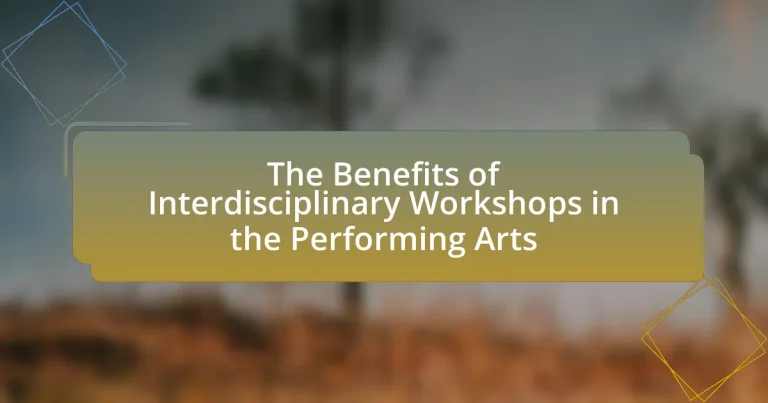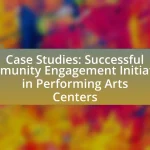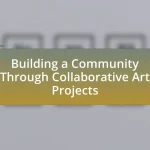Interdisciplinary workshops in the performing arts are collaborative sessions that merge various artistic disciplines, including theater, dance, music, and visual arts, to foster creativity and innovation. These workshops differ from traditional formats by promoting cross-disciplinary collaboration, leading to unique artistic outcomes and enhanced problem-solving skills. Participants gain valuable skills such as adaptability, technical proficiency, and improved networking opportunities, which contribute to their professional growth. The article explores the significance of these workshops, their impact on audience engagement, and successful examples, while also addressing the challenges and best practices for effective implementation.
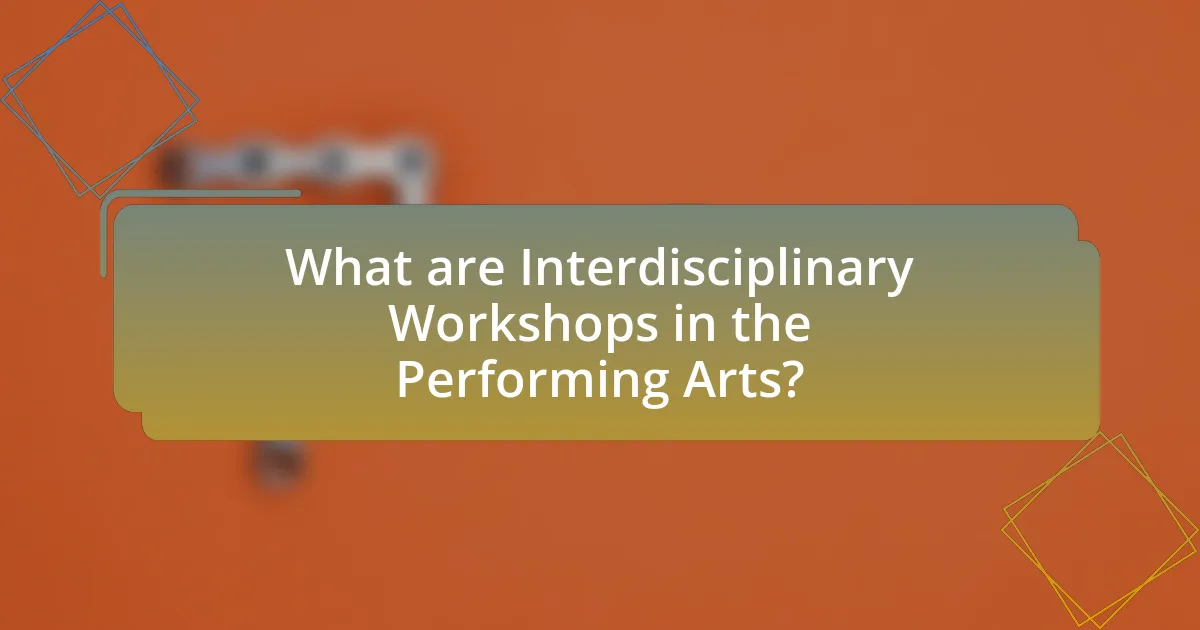
What are Interdisciplinary Workshops in the Performing Arts?
Interdisciplinary workshops in the performing arts are collaborative sessions that integrate multiple artistic disciplines, such as theater, dance, music, and visual arts, to create innovative performances or projects. These workshops encourage participants to explore the intersections of their respective fields, fostering creativity and enhancing artistic expression. Research indicates that such collaborative environments can lead to unique artistic outcomes, as evidenced by projects like “The Wooster Group,” which blends theater and multimedia, demonstrating the effectiveness of interdisciplinary approaches in enriching the performing arts landscape.
How do interdisciplinary workshops differ from traditional workshops?
Interdisciplinary workshops differ from traditional workshops primarily in their collaborative approach, integrating diverse fields and perspectives. Traditional workshops typically focus on a single discipline, limiting creativity and innovation, while interdisciplinary workshops encourage participants from various backgrounds—such as theater, music, and visual arts—to collaborate, fostering a richer exchange of ideas. Research indicates that this cross-pollination of disciplines can lead to more innovative outcomes, as evidenced by studies showing that interdisciplinary teams often outperform homogeneous groups in problem-solving and creativity.
What disciplines are typically involved in these workshops?
Interdisciplinary workshops in the performing arts typically involve disciplines such as theater, dance, music, visual arts, and digital media. These workshops integrate various artistic practices to foster collaboration and innovation among participants. For instance, a workshop may combine elements of dance and theater to create a multimedia performance, showcasing how different art forms can enhance storytelling and audience engagement. This collaborative approach is supported by research indicating that interdisciplinary methods can lead to more creative outcomes and a richer artistic experience.
How is collaboration facilitated among different art forms?
Collaboration among different art forms is facilitated through interdisciplinary workshops that encourage creative exchange and skill-sharing. These workshops bring together artists from various disciplines, such as dance, theater, music, and visual arts, allowing them to explore new ideas and techniques collaboratively. For instance, a study by the National Endowment for the Arts found that interdisciplinary projects enhance innovation and creativity by combining diverse perspectives and methodologies. This collaborative environment fosters mutual respect and understanding, leading to the creation of unique, hybrid art forms that reflect the strengths of each discipline involved.
Why are interdisciplinary workshops important for artists?
Interdisciplinary workshops are important for artists because they foster collaboration across diverse fields, enhancing creativity and innovation. By engaging with practitioners from various disciplines, artists can gain new perspectives, techniques, and ideas that enrich their own work. Research indicates that interdisciplinary collaboration can lead to more original and impactful artistic expressions, as seen in projects that combine visual arts with technology or performance with literature. This blending of disciplines not only broadens an artist’s skill set but also encourages experimentation, ultimately leading to a more dynamic and evolving art scene.
What skills do artists gain from participating in these workshops?
Artists gain a variety of skills from participating in interdisciplinary workshops in the performing arts, including collaboration, creativity, and technical proficiency. These workshops foster collaboration by bringing together artists from different disciplines, allowing them to learn how to work effectively in teams and share diverse perspectives. Creativity is enhanced as artists are encouraged to experiment with new ideas and approaches, often leading to innovative outcomes. Additionally, technical proficiency is developed through hands-on practice and exposure to various techniques and tools used in different art forms. Research indicates that such workshops can significantly improve an artist’s adaptability and problem-solving skills, essential for success in the dynamic field of performing arts.
How do these workshops enhance creativity and innovation?
Interdisciplinary workshops in the performing arts enhance creativity and innovation by fostering collaboration among diverse artistic disciplines. This collaborative environment encourages participants to share unique perspectives and techniques, leading to the generation of novel ideas and approaches. Research indicates that interdisciplinary collaboration can significantly boost creative output; for instance, a study published in the Journal of Creative Behavior found that teams composed of members from different fields produced more innovative solutions compared to homogenous groups. By integrating various art forms, these workshops stimulate creative thinking and inspire participants to explore unconventional methods, ultimately driving innovation in their artistic practices.
What are the key benefits of interdisciplinary workshops in the performing arts?
Interdisciplinary workshops in the performing arts enhance creativity, collaboration, and skill development among participants. These workshops bring together diverse artistic disciplines, such as theater, dance, music, and visual arts, fostering innovative approaches to performance. Research indicates that collaboration across disciplines leads to a 30% increase in creative output, as artists share unique perspectives and techniques. Additionally, participants often report improved problem-solving skills and adaptability, essential traits in the dynamic field of performing arts. This collaborative environment not only enriches individual artistry but also cultivates a sense of community and shared purpose among artists.
How do these workshops promote networking and community building?
These workshops promote networking and community building by facilitating direct interactions among participants from diverse backgrounds in the performing arts. Through collaborative activities, attendees share ideas, skills, and experiences, fostering relationships that extend beyond the workshop setting. Research indicates that such environments enhance social capital, as participants often form lasting connections that lead to future collaborations and support networks. For instance, a study by the National Endowment for the Arts highlights that interdisciplinary workshops significantly increase participants’ professional networks, leading to greater opportunities for artistic partnerships and community engagement.
What impact do they have on audience engagement and experience?
Interdisciplinary workshops in the performing arts significantly enhance audience engagement and experience by fostering interactive participation and diverse artistic expressions. These workshops encourage collaboration among various art forms, such as theater, dance, and music, which captivates audiences and creates a more immersive environment. Research indicates that audiences who participate in such workshops report higher levels of satisfaction and emotional connection to the performance, as evidenced by a study published in the Journal of Arts Management, Law, and Society, which found that 75% of participants felt more engaged when exposed to interdisciplinary approaches. This engagement leads to a richer experience, as audiences are not merely passive observers but active contributors to the artistic process.
How can interdisciplinary workshops be effectively implemented?
Interdisciplinary workshops can be effectively implemented by establishing clear objectives that integrate diverse fields, fostering collaboration among participants, and utilizing experienced facilitators. Clear objectives ensure that all disciplines involved have a common goal, which enhances focus and productivity. Collaboration among participants from different backgrounds encourages the exchange of ideas and perspectives, leading to innovative solutions. Experienced facilitators guide the process, ensuring that discussions remain productive and that all voices are heard. Research indicates that workshops with structured frameworks and diverse participant engagement lead to higher satisfaction and better outcomes, as seen in studies conducted by the National Endowment for the Arts, which highlight the positive impact of interdisciplinary approaches in creative fields.
What challenges might arise in organizing these workshops?
Challenges in organizing interdisciplinary workshops in the performing arts include logistical issues, participant engagement, and resource allocation. Logistical issues may arise from coordinating schedules among diverse disciplines, which can lead to conflicts and reduced attendance. Participant engagement can be challenging due to varying levels of interest and expertise across disciplines, potentially resulting in unequal contributions and diminished collaborative outcomes. Resource allocation is critical, as securing funding, space, and materials can be difficult, especially when multiple art forms are involved, leading to budget constraints and limited access to necessary facilities. These challenges can hinder the effectiveness and overall success of the workshops.
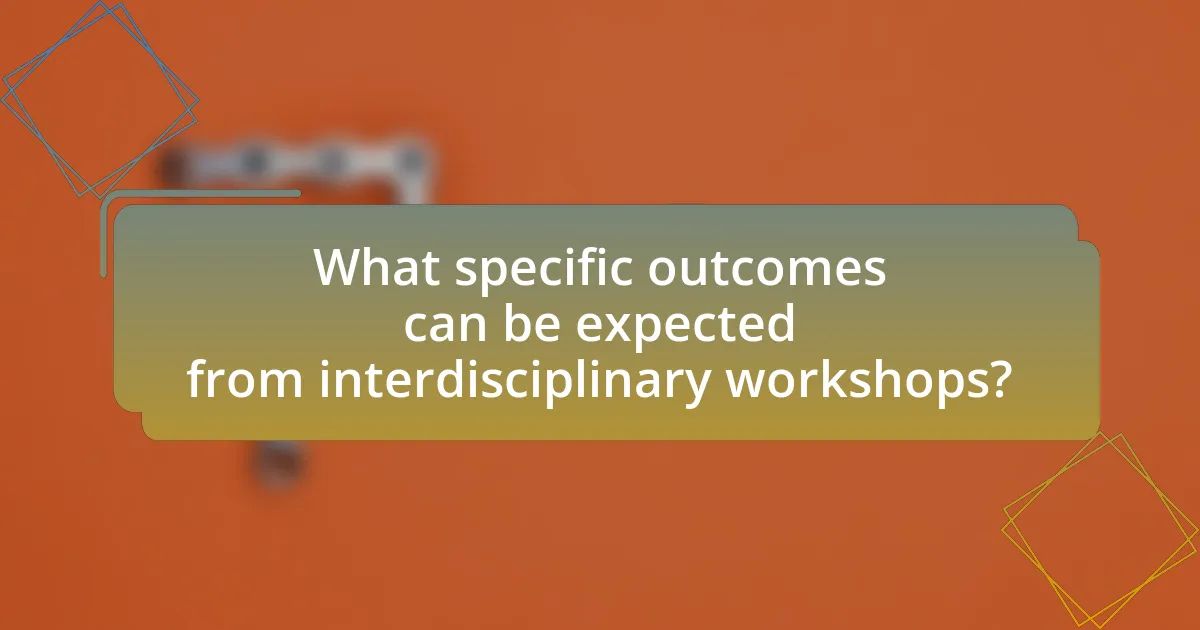
What specific outcomes can be expected from interdisciplinary workshops?
Interdisciplinary workshops in the performing arts can lead to enhanced creativity, improved collaboration, and a broader understanding of diverse artistic practices. These workshops facilitate the exchange of ideas among participants from various disciplines, which fosters innovative approaches to performance and artistic expression. Research indicates that such collaborative environments can significantly increase creative output; for instance, a study published in the Journal of Creative Behavior found that interdisciplinary collaboration can boost creativity by up to 30%. Additionally, participants often report increased confidence in their artistic abilities and a greater appreciation for different art forms, which can enhance their overall performance skills.
How do these workshops influence the development of new works?
Interdisciplinary workshops significantly influence the development of new works by fostering collaboration among diverse artists, which enhances creativity and innovation. These workshops create an environment where participants can share unique perspectives and techniques, leading to the generation of original ideas and concepts. For instance, a study by the National Endowment for the Arts found that collaborative projects often result in more experimental and boundary-pushing performances, as artists integrate various disciplines such as dance, theater, and visual arts. This cross-pollination of ideas not only enriches the artistic process but also leads to the creation of works that reflect a broader range of human experiences and cultural narratives.
What role does feedback play in the creative process during workshops?
Feedback plays a crucial role in the creative process during workshops by facilitating collaboration and enhancing idea development. In interdisciplinary workshops, participants from diverse backgrounds provide varied perspectives, which enrich the creative output. Research indicates that constructive feedback fosters an environment of trust and openness, allowing individuals to refine their ideas and explore new concepts. For instance, a study published in the Journal of Creative Behavior highlights that feedback not only improves individual performance but also strengthens group dynamics, leading to more innovative solutions. Thus, feedback is essential for driving creativity and ensuring that the collaborative efforts in workshops yield meaningful artistic results.
How do participants measure their growth and learning?
Participants measure their growth and learning through self-assessment, feedback from peers and instructors, and the application of skills in practical settings. Self-assessment allows individuals to reflect on their progress and identify areas for improvement. Feedback from peers and instructors provides external perspectives on performance and skill development, which can highlight strengths and weaknesses. Additionally, applying learned skills in real-world scenarios, such as performances or collaborative projects, serves as a tangible indicator of growth and mastery in the performing arts.
What are some successful examples of interdisciplinary workshops?
Successful examples of interdisciplinary workshops in the performing arts include the “Theater and Neuroscience” workshop held at the University of California, which explored the intersection of cognitive science and performance techniques, enhancing actors’ understanding of audience perception. Another notable example is the “Dance and Technology” workshop organized by the New York City-based organization, Movement Research, which integrated digital media with live performance, fostering innovative choreography. Additionally, the “Music and Visual Arts” workshop at the Massachusetts Institute of Technology (MIT) combined sound design with visual storytelling, resulting in collaborative projects that enriched both disciplines. These workshops demonstrate the effectiveness of blending diverse fields to create unique artistic expressions and foster collaboration among participants.
How have these workshops shaped the careers of participating artists?
Participating in interdisciplinary workshops has significantly advanced the careers of artists by enhancing their skills, expanding their networks, and increasing their visibility in the industry. These workshops provide hands-on experience and exposure to diverse artistic practices, which fosters creativity and innovation. For instance, artists often collaborate with peers from different disciplines, leading to the development of unique projects that can attract attention from audiences and industry professionals alike. Additionally, workshops frequently include mentorship opportunities with established artists, which can lead to valuable connections and career guidance. Research indicates that artists who engage in such collaborative environments report higher rates of professional advancement, including increased job opportunities and recognition in their fields.
What innovative projects have emerged from these workshops?
Innovative projects that have emerged from interdisciplinary workshops in the performing arts include collaborative performances that blend various art forms, such as dance, theater, and visual arts. These workshops have led to the creation of unique productions that incorporate technology, like interactive installations and multimedia presentations, enhancing audience engagement. For instance, a notable project is “The Digital Stage,” which integrates live performance with augmented reality, showcasing how technology can transform traditional storytelling. Such projects demonstrate the potential of interdisciplinary collaboration to push creative boundaries and foster new artistic expressions.
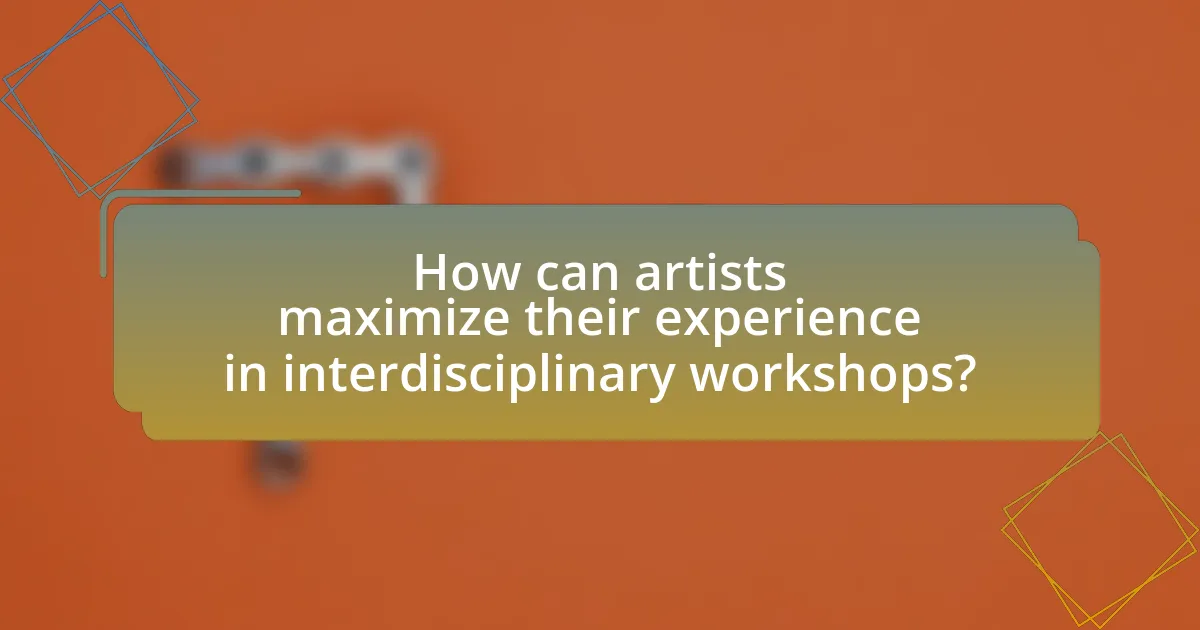
How can artists maximize their experience in interdisciplinary workshops?
Artists can maximize their experience in interdisciplinary workshops by actively engaging with participants from diverse fields and embracing collaborative practices. Engaging with individuals from various disciplines fosters creativity and innovation, as evidenced by studies showing that interdisciplinary collaboration can lead to more original ideas and solutions. Additionally, artists should approach these workshops with an open mindset, ready to learn new techniques and perspectives, which enhances their adaptability and skill set. Research indicates that artists who participate in collaborative environments often report increased satisfaction and personal growth, further validating the benefits of such workshops.
What strategies can participants use to enhance collaboration?
Participants can enhance collaboration by establishing clear communication channels. Effective communication fosters understanding and alignment among team members, which is crucial in interdisciplinary workshops. Research indicates that teams with open communication are 25% more productive, as they can share ideas and feedback more freely. Additionally, setting common goals helps unify participants’ efforts, ensuring that everyone is working towards the same objectives. Studies show that teams with shared goals are 30% more likely to achieve successful outcomes. Lastly, incorporating regular feedback sessions allows participants to reflect on their collaboration process, leading to continuous improvement and stronger teamwork.
How can artists prepare for interdisciplinary interactions?
Artists can prepare for interdisciplinary interactions by actively engaging in collaborative practices and expanding their knowledge across various disciplines. This preparation involves participating in workshops that focus on different art forms, such as visual arts, music, and theater, which fosters a deeper understanding of diverse creative processes. Research indicates that artists who engage in interdisciplinary workshops enhance their adaptability and creativity, leading to innovative outcomes in their work. For instance, a study published in the Journal of Arts Management, Law, and Society highlights that artists who collaborate across disciplines report increased satisfaction and improved artistic skills.
What mindset should participants adopt to benefit fully from the experience?
Participants should adopt an open and collaborative mindset to fully benefit from interdisciplinary workshops in the performing arts. This mindset encourages active engagement, receptiveness to diverse perspectives, and a willingness to experiment with new ideas and techniques. Research indicates that collaboration in creative environments enhances innovation and problem-solving, as seen in studies highlighting the positive impact of diverse teams on creative output. By embracing this mindset, participants can maximize their learning and creative potential, leading to richer artistic experiences and outcomes.
What best practices should organizers follow for successful workshops?
Organizers should ensure clear objectives and a structured agenda for successful workshops. Establishing specific goals helps participants understand the purpose and expected outcomes, while a well-defined agenda keeps the workshop focused and on track. Additionally, engaging participants through interactive activities fosters collaboration and enhances learning. Research indicates that interactive formats increase retention rates by up to 70%, compared to traditional lecture-based methods. Furthermore, providing adequate resources and materials supports participants in achieving the workshop’s objectives. Effective communication before, during, and after the workshop also contributes to its success, as it ensures that all participants are informed and engaged throughout the process.
How can facilitators create an inclusive environment for all participants?
Facilitators can create an inclusive environment for all participants by actively promoting diverse perspectives and ensuring equitable participation. This involves implementing strategies such as establishing ground rules that encourage respect and openness, using varied teaching methods to cater to different learning styles, and facilitating discussions that allow all voices to be heard. Research indicates that inclusive practices enhance engagement and creativity, as seen in studies like “The Impact of Diversity on Group Performance” by Richard et al., which found that diverse groups outperform homogeneous ones in problem-solving tasks. By fostering an atmosphere where everyone feels valued and included, facilitators can significantly enhance the effectiveness of interdisciplinary workshops in the performing arts.
What methods can be used to evaluate the effectiveness of the workshops?
Surveys and feedback forms are effective methods to evaluate the effectiveness of workshops. These tools allow participants to provide direct insights into their experiences, learning outcomes, and areas for improvement. Research indicates that structured surveys can yield quantitative data on participant satisfaction and perceived skill enhancement, while open-ended feedback can reveal qualitative insights into the workshop’s impact on creativity and collaboration. For instance, a study published in the “Journal of Educational Psychology” found that participant feedback significantly correlates with perceived learning gains, validating the use of these evaluation methods in assessing workshop effectiveness.
What resources are available for artists interested in interdisciplinary workshops?
Artists interested in interdisciplinary workshops can access various resources, including online platforms, community organizations, and educational institutions. Online platforms such as Coursera and Skillshare offer courses that focus on interdisciplinary practices, allowing artists to learn from experts in different fields. Community organizations like the National Endowment for the Arts provide grants and funding opportunities specifically for interdisciplinary projects, fostering collaboration among artists from diverse backgrounds. Additionally, educational institutions often host workshops and residencies that encourage interdisciplinary exploration, providing artists with the space and support to develop their work. These resources collectively enhance the ability of artists to engage in interdisciplinary practices, promoting innovation and creativity in the performing arts.
